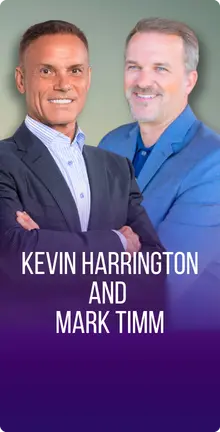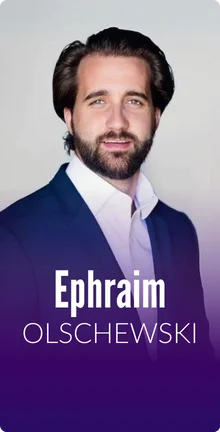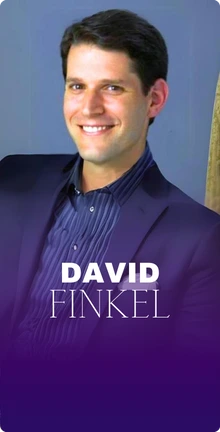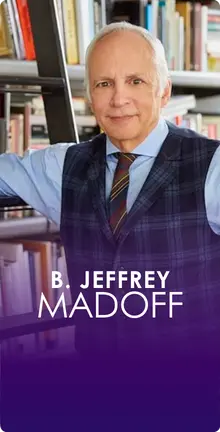In this Episode
- [00:39]Stephan introduces Jeff Hoffman, a successful entrepreneur, motivational speaker, bestselling author, and Hollywood film producer. He’s been part of a number of well-known successful startups, including Priceline.com/Booking.com, uBid.com, and more.
- [04:57]Jeff talks about William Shatner and Kaley Cuoco as Priceline’s spokespersons.
- [09:37]Jeff shares what he learned from Hollywood that he applied to his marketing strategies about focusing on the customer’s emotional response.
- [15:08]Jeff tells us the names of business speakers that moved and mesmerized him in the industry.
- [19:46]Jeff shares an interesting story on how he got involved in social entrepreneurship, and how he believes that it happened for a reason.
- [25:05]Jeff tells one of his epiphany moments where he helped a shelter for abused women from being evicted by watching the TV news.
- [29:59]Stephan shares how he volunteers in organizations to reveal light in the world and do something impactful.
- [35:52]Stephan asks Jeff the writing on his whiteboard that says, “Sell More Flowers.”
- [39:54]Jeff shares an example of the concept of open-book management that he witnessed through Sam Walton and one of Sam’s employees.
- [43:44]Visit Jeff Hoffman’s website at jeffhoffman.com to learn more about his Explosive Growth Workshop and Monthly Mastermind.
Jeff, it’s so great to have you on the show today.
Thank you so much for having me excited to be here.
So first of all, I’m sure you get this question a lot, but I’m dying to hear the answer. How did you and the team land, William Shatner? How did you guys get William Shatner to be the spokesman for Priceline for so many years?
There are two parts to the story. The first part is really important, especially for your listeners in marketing and brand building. The most recognizable companies sit and intentionally decide what personality they want their company to have. What’s the look and feel of the company and interacting with the company? A lot of times I tell people–this is a fun exercise, “Go up to the whiteboard and ask yourself this question. If our company was a human being, what would he or she be like?” So part of the exercise was in the early days, Priceline comprehending what it wanted to feel the company be. And that personality description perfectly fits Captain James T. Kirk of the Starship Enterprise. That’s the first half of the story.
Entrepreneurship is the toolset of change. Entrepreneurs design the future. Share on XThe second half has the marketing department trying to reach out to a person like that. Hard to get to, wasn’t interested; the initial response was, “Your some unknown startup with a small group of people with an unproven concept,” right? It was the reverse auction, “name your own price.” “Why would I possibly do that?” Then to make it quote worse, the offer was, we won’t pay you any cash, we’ll give you founder shares in the company. And here’s the sarcastic Shatner saying, “I’m gonna have money to do business with a startup no one’s heard of with the idea that probably won’t work.” That was kind of his opening line. In the end, though, he thought that the reverse auction, which is what Jay Walker, the guy that had the original idea for Priceline, had a patent on a reverse auction, where the name your own price part. And Shatner was smart enough to say, that’s kind of a cool proposition. Name your own price, what do you mean? Make an offer for an empty hotel room. That’s kind of cool. So he did sign up, he did do an equity deal, and the rest is history. He made millions of dollars instead of thousands of dollars and have been paid cash. And after that, every celebrity in Hollywood tried to join an internet company, after the Shatner and Priceline story. And it was so successful that 20 years later, right? He’s still part of the program.
Now, is Priceline still working with him, or is that kind of a thing of the past?
No, he’s still actively the Priceline negotiator doing a lot of commercials. But to appeal marketing-wise, you have to constantly refresh and look at a shifting demographic. And what you got was, as you moved into this younger generation of travelers and consumers. I would ask somebody, “Do you know who William Shatner is?” They said, “Yeah, he’s the Priceline guy on Priceline commercial.” I said, “Well, he’s Captain James T. Kirk.” They said, “That’s Patrick Stewart,” or “Chris Pine.”
To appeal marketing-wise, you have to constantly refresh and look at a shifting demographic.
Neither of those people is the correct answer. I was like, “Shatner was Captain Kirk.” They’re like, “No, Jeff, I think you’re wrong.” So I was like, Wow, you guys are a generation now of younger consumers that don’t have an awareness of them, which is why the company which now is done by an ad agency, all that original copy was done internally in-house used to write our ad copy. That’s why the company brought in Kaley Cuoco, the blonde from Big Bang Theory, to still keep that science and nerd feel, high-tech feel. But for somebody young and with female demographics. Shatner’s still there, along with Penny from Big Bang, to appeal to a broader audience.
Cool. How did you end up going from, or to maybe it was, like a successful startup that joined forces with booking.com? I’m not quite sure of that story, but you also were involved with Hollywood and with getting Emmys and Grammys and things like that. That’s a pretty different kind of world.
I’ll tell you, and I know this will mean a lot to you, and the answer is one word: marketing. As I said, we did the Priceline creative ourselves, right? When we were launching our consumer business, for example, we launched something called Priceline Yard Sale. And so I was working with Shatner as well on copy and thinking a lot about how do you get consumers to respond and do what you want them to do? So for me, two things happen.
One was the power of music after one night when I had a really bad day, and the whole world seemed to be caving in which all of us have those days, right? And I went to a concert with some friends. It happened to be an Elton John concert, which was good because I know every word of every song. And I noticed the power of music. That night, there was no race; there was no gender; there was no ethnicity; all your problems went away. Everyone in the whole room was just singing and enjoying themselves. And that affected me in a very personal way, but the one that drove me was a movie. It was a sequel. It happened to be the Hannibal Lecter sequel, The Silence of the Lambs.

I remember the Hollywood hype. It came out on a Friday. Me and my friends went on Friday opening night, and we were excited for two weeks. We waited outside a long line, and we overspent money on snacks and everything. It is 10 minutes into the movie when I realized the movie was a complete piece of crap. This is an editorial opinion. I hated that movie, the sequel I’m talking about. And I thought, kudos to the Hollywood marketing machine. Because for weeks, I’ve been waiting for this moment, I spent all my money. I stood outside in line, and I left work early for a piece of crap product.
And I started thinking, how do they do this? And I realized, I don’t think there’s a better marketing machine in the world that knows how to tug at our heartstrings and play our emotions and cause us to take action in Hollywood. So that was a driver for me where I want to go get into that business and figure out what they do in marketing, that makes it so successful. So that’s part of why I left tech and had a foray into entertainment because I thought I could learn the marketing techniques of Hollywood and apply them to my non-Hollywood businesses as well.
Create the emotional state you want and drive the action you want them to have, do all that intentionally.
And what was the biggest learning that you got from that little foray?
Part of the biggest learning was that you have to think about it. So let me phrase it this way. You want a customer that engages your marketing, there are two results, you want them to achieve a certain emotional response, right? I don’t care if you’re selling a b2b product to executives; they are still human beings. And so there is an emotional state you want someone to be in as soon as they finish encountering your marketing and collateral. And then there’s a call to action, there’s something you need them to do, getting people all roused up, and then not doing anything doesn’t work.
What I learned from Hollywood was to start at that end, which we didn’t use to do. We used to create marketing, push our collateral out in the world, and then wonder why people didn’t do what we thought they were going to do, or watch to see how they were going to react. Instead, the learning for me was to start at the other end and ask, what emotional response do I want you to have to my marketing and then what action do I want you to take a right at that moment. And then design my marketing to cause those two things to happen, instead of a hope that those two things happen. I’m going to give you an example that I took back up to business when I was using this technique and thinking about how to drive business.
The most recognizable companies are the ones that actually sit and intentionally decide what personality they want their company to have. Share on XIn one of my businesses, we used to say, like everybody else, we would say thank you for your business, right? Thank you for doing business with us. Thank you for buying my product. We appreciate you. That’s what businesses do, and they thank you. But I was thinking about what I just told you, what emotional response do I want people to have? What I wrote down was, “I want them to feel like they just won something.” And the reason I want them to feel like they just won something is that the action I want them to have at this point is I want them to go tell all their friends, so they all buy something from me. So if the action you want is going to tell everybody, then the emotion you want is some level I just won something, because I did this exercise. What things happen in the world that you want to tell your friends? That you bought a book? No. Did I buy a new shirt? No, these are not things. “Oh my god, I bought a book you guys, everybody come over and see it.” That ain’t it.
But I was writing these down and with my team, and I came across one. If you won the lottery, you bought a lottery ticket, or you pulled the handle in the slot machine, and money poured out, you’re going to tell all your friends, “Oh my god, I bought a lottery ticket, and I won.” You’re going to tell everybody. So if that’s the action you want to go tell everybody what just happened, then the emotional response you want is, I just want something. And so we changed. We actually changed all of our marketing, and this is post-sale marketing, but it’s still marketing, you’re upselling, and you’re cross-selling, and you’re trying to bring in new customers. Instead of saying thank you for your business. We didn’t use the word, thank you anymore. If we use the word congratulations. So people bought something instead of saying thank you, we say congratulations. And they’re like for what? What did I do? Did I win something? And we said, “Congratulations on securing an amazing deal. By buying this product from us, you just outsmart the system and beat the field that all your friends got. You should be proud of yourself. You’re a winner.” And they’re like, “Oh my god, I won something.”
Entrepreneurship is the toolset of change. Entrepreneurs design the future, and they use their tools to create a better world.Jeff Hoffman
And we changed the graphic in our marketing, actually to a slot machine. And the slot machine would spin, and what would come up with our logo once, twice, three times, confetti would fly, and we say, “Congratulations on the brilliant buying decision you just made.” And so the emotional response wasn’t thank you. It was, “I did great. I won something, they’re congratulating me. I must have done well, I should tell all my friends what a brilliant buying decision I made today,” and it worked. So the congratulatory casino slot machine approach caused people to go tell all their friends what a great deal they got from us, and they started bringing all their friends to buy from us. So that I learned from Hollywood, create the emotional state you want, and therefore drive the action you want them to have and do all that intentionally. I learned that lesson that day sitting in the theater saying, “How did these people get me here?” They got me to do what they wanted; they got me to feel how they wanted. Now, in that case, I regretted my decision. We want our customers to love their decision, but that’s the example of how we use it.
Wow, that’s amazing. And it wasn’t from a book, some thought leader Bob Cialdini, for example, or BJ Fogg, somebody who kind of studied the behaviors and the motivations of people to kind of reverse engineer for marketing purposes. No, you just were in a movie that sucked. Pretty cool.
I was like, “How did they get me so excited about this movie?” I want that. Yeah, it was a little reverse engineering because I thought through that, but that’s why I went into the industry. I said, “I want to go work with some of these people and ask them, what’s your process?” And that’s where I learned to start with the emotional state and call to action and work backward from there.

Okay. By the way, were there any thought leaders, big-name authors, researchers that you were able to glean lots of powerful insights from?
Unfortunately, I’m going to say no, but I’m not telling you that’s a good answer. I’m telling you, that’s an honest answer. Because we were so heads down busy doing this, that I didn’t invest the time. So I do recommend, and you probably have some good recommendations from doing this from people you’ve talked to. So I was not an avid reader of other people’s work then because I was so buried in my work. And I don’t think that’s a good answer, that’s just an honest answer. No, we weren’t influenced by other people. We were influenced by an iterative process, try this, go out and talk to consumers and iterate based on live feedback.
Well, as a keynote speaker, you must have heard some other speeches that were powerful, and you were able to leverage some of that maybe Simon Sinek or Seth Godin or whoever, like any names come to mind of people that just kind of rock your world with their speeches?
Reasonable people adapt themselves to the world around them, unreasonable people expect the world to adapt to them.
Yeah, there’s numerous. Mark Victor Hansen, I love his speeches. His co-author in Chicken Soup for the Soul Jack Canfield, the same. I’ve been on stage with both of them and been mesmerized by the way they pitch. There’s a business speaker, Verne Harnish, who’s the creator of Entrepreneurs’ Organization. I love the way he presents information. So there are definitely numerous people. Brad Feld Startup Communities, he doesn’t speak as often, but I like the way he lays out the sort of thesis behind what he’s speaking about when he’s talking about his writing and his book. So there are definitely speakers that have moved me. I’ve paid close attention to their style and technique the way that they speak.
Right. Now, you mentioned Verne Harnish and Entrepreneurs’ Organization, aren’t you involved with some entrepreneurial organizations yourself and kind of giving back in some fashion? I thought I saw something on your website about that.
Yes, sir. One of them is I am the chairman of the Global Entrepreneurship Network, which is a Washington DC-based nonprofit. That’s GEN Global Entrepreneurship, genglobal.org. That is an organization we are now on the ground in 177 countries with a simple mission statement, to help anybody anywhere that wants to launch a new business venture. So we work with startups and entrepreneurs and entrepreneurial ecosystems all over the world. And that is nonprofit work. But that is because of my fundamental belief that entrepreneurship is the toolset of change. Entrepreneurs design the future, and they use their tools to create a better world. So I committed to giving back, as did our whole global entrepreneurship network, by helping entrepreneurs succeed all over the world. That’s one. The other one is an organization called The Unreasonable Group, and unreasonable–by the way that is named after a famous quote by the Irish.
If you want to continuously appeal to your audience, you have to constantly refresh your strategies and take a closer look at the shifting demographic. Share on XI was thinking that.
George Bernard Shaw, who talked about the fact that reasonable people adapt themselves to the world around them, unreasonable people expect the world to adapt to them. And so he said; therefore, all progress is dependent upon reasonable people. So I’m the founding board member and mentor to The Unreasonable Group, and similarly, we work with entrepreneurs all over the world. But the difference between what I just talked about, GEN, is that Unreasonable focus is on social entrepreneurs. And we focus on supporting entrepreneurs all over the world, who are working to solve the world’s biggest problems, kind of aligns with the United Nations 17 goals to make the world a better place by 2030.
So that is focused on helping social entrepreneurs deal with everything from off-grid power to drinking water to feeding the world to a long list of the world’s biggest problems and using the skill set and innovation of entrepreneurs to solve them. So I spend a lot of my time these days with those two organizations trying to give back by teaching entrepreneurship to people all over this country and all over the world. Back last year, I celebrated global entrepreneurship as an example. Well, I opened the Tel Aviv stock exchange in Israel, but we launched Global Entrepreneurship Week in Israel. And we did events across the whole Middle East, teaching entrepreneurship for last year’s opening for that event.
Your company may not save the world, but your life should.
Super cool. And what started you down this path of wanting to be involved with these two organizations and not something else, like, for example, I’m on the board of Impact Network, which builds schools and operates them in Zambia and rural villages where they wouldn’t get an education, otherwise, they would just be hauling water or whatever, in attending animals, what have you. And so that was because I met the co-founder in a mastermind that I was part of run by Neil Strauss. And I’m guessing there was some sort of chance meeting or connection, and it wasn’t chance, I don’t believe in coincidence. So what happened?
Absolutely. Things happen for a reason. So I’ll tell you both of them. The reason one was cool. Back when the term social entrepreneurship was a thing, I hated that term because entrepreneurs thought they were supposed to make a choice, right? Do I want to make a positive impact on the world or make money? And the answer is, one leads to the other. If you are profitable, you can scale and help more people. It was never a choice. And by the way, your company may not save the world or your product, but your life should. We sold hotel rooms for a living but we used our success to impact many charities. So social entrepreneurship does not mean that your company provides drinking water, right? It means that you are a responsible citizen who uses your success to help people. So I didn’t like that term.
Nonetheless, at the time, the White House decided to hold the social impact awards to recognize social entrepreneurs who were making the most impact, and the head of the White House asked me to host it. So as the host of the Social Impact Awards, before I went to the White House, I said, “Well, give me info on the winners. So I can be prepared as I bring them up on the stage to say a few words about what they do,” And there was one young man, 20 something years old man, Daniel Epstein, who I was just blown away by his focus, his work ethic, his purity of mission his giving back to nature, his selflessness, etc. He was one of the winners. And so it was funny, because that night at that event, I was like coming up to him afterward to say, “Hey, I want to spend time with you.” And he said, “Jeff, I’m glad you’re here. Everybody told me I should meet you.” And I was like, “Wait, I was looking for you.” He said, “I was looking for you.” So we spent the evening together. And that is the year that he founded the Unreasonable Group. And so that’s why I said I was a founding board member and original mentor on it because he was my mentee.

When he started Unreasonable Group, I was there from the beginning, and I’m just giving you an idea of how amazing that team and unreasonable is. Today, in the portfolio–I’m all about impact, right? One of the things you can’t see because it’s behind me and it’s on my other wall, this used to be on the door of my office. It said, “Ideas are welcome here, but execution is worshipped,” and I wrote that because everybody talks, everybody’s got an idea, and very few people do something. I’m a big believer in impact. Okay, stop talking already, and go build something and go create. Sometimes people in my office tell me their idea, and I’m thinking, the amount of time you spent here talking, you probably could have built a prototype. In the amount of time, you’ve been telling me about this thing.
So I’m very focused on actually having an impact, and I’m so I’m proud of Unreasonable’s accomplishments since Daniel launched it, he’s still the CEO. There are 223 social startups in the portfolio; they are doing business in 187 countries now. They have impacted more than 500 million lives around the world and collectively raised $4.3 billion in financing to fund these social startups. Unreasonable has been an amazing success since the day it started. I agree with you, there are no coincidences. That night at the White House afterward, at dinner, we were looking for each other and found each other, and he’s been family ever since.
The other one is similar. With the CEO of Global Entrepreneurship Network, a gentleman named Jonathan Ortmans. And by the way, on Unreasonable is just unreasonablegroup.com, GEN is genglobal.org. But anyway, the same thing happened when Jonathan, who is starting the Global Entrepreneurship Network, reached out to me, he said, “We’d like you to be our speaker entrepreneur because you were one your whole life.” He said, “You’ve spent your entire life building companies, so you know what they go through every day. So could you come to speak at a conference for us?” And the rest of that is history as well. I wound up being on the board, and I’ve been serving as the chairman of it. So you’re right, things happen for a reason, and there are no coincidences.
Ideas are welcome, but execution is worshipped.
Yeah. Are there other synchronicities that you want to share that was profoundly impactful in your life? And maybe in the lives of many others because of the follow on effect?
Well, there are a lot. The words, I think you actually can see them behind me, on the top of that board. And that was an epiphany moment in my life that changed everything for me. And what happened was, I had been influenced by Silicon Valley, the investor world, like people would put on their LinkedIn profile, three exits. So clearly, the measure of you as a human was a financial success. This person had an exit, what’s your exit strategy? How many exits are there? everything’s he focused on in the startup world, on this concept of money, and how much money you made, and that was the measure of success. I guess I was influenced by that because we were working hard to sell, we had companies.
We had failures. I had some insanely, stupid ideas in my life. It failed miserably. But we also had acquisitions that I was able to sell companies to fortune 500 companies, and then we had IPOs, I was part of multiple successes. And so there was a moment in life that I thought that’s what I was supposed to be doing. Build companies, take them public, sell them, exits, and money. And because that’s what everybody pats you on the back for. But it turns out that I’m not pretending that I was upset that we were successful, but it was not nearly as fulfilling, right? I was blessed enough to sell our first exit, we sold a company when I was still in my 20s, and we sold the company for millions of dollars. And I was like, that’s it, everybody. This is the rat race that everybody’s in every day to get to this. It just wasn’t as thrilling or fulfilling as I thought.
If you want a customer that engages with your marketing, you need to do two things: get them hooked emotionally and convince them to do your call to action. Share on XSo one day, I’m feeling that way, turned the TV on, and there’s a story on the news about a shelter for abused women that’s being closed because they ran out of money. And all the women are being sent, who knows where. They’re all crying hysterically on TV because they have nowhere to go. One woman is saying, “If I have to go back home, he’ll probably kill me. He told me if you ever saw me again, he killed me,” this is her husband. And she said, “I’ve been hiding in this house. And now it ran out of money. We’re all being evicted, and I have nowhere to go, no money, no family. I guess I have to go back there, and I’ll probably be killed.” I was like, oh my god, are you kidding me? And so while watching these stories, I said, all of us are guilty of this, when you are watching, seeing a problem in the world around you, wherever you are, we have this tendency to say, man, they should help those people. So I said they should help those women.
And so here’s the synchronicity of me being at that moment watching TV at that second, that story, while I was feeling that emotion about making money can’t be all the reason I’m here. All those things happened at once. And the inflection point, the epiphany moment in my life as I stood up and I wrote those four words that are behind me. I said, wait a minute, if everybody that sees a problem in the world is saying to themselves, “Man, they should help those women, they should fix this problem,” then nobody fixes the problem because we’re all saying they should do it. So I stood up, and I wrote down on my board, there is no “they.” I was like, oh, my God, there is no they. They aren’t going to help those women, and they aren’t going to fix problems, you are, right? I am. If I don’t get up and go over that women’s shelter and do something myself, nobody’s going to. So I did. The next morning, I called the news and said, “Can you give me the info on that story you ran last night?” They gave me the info on the shelter, and I contacted their bank. And I went to my bank, and I paid for the house. And it changed everything for me.
Your success is someone else’s miracle.
There’s another quote, and it’s at the bottom there by me, it says, “Your success is someone else’s miracle.” And the reason it’s on there is because–I did this whole thing anonymously–that night on the news. The women were all crying again, but they were crying out of happiness. And the woman that ran the shelter said, “It’s a miracle. Some guy funded, paid for the shelter for abused women, and now we all safely have a place to say and nothing to worry about.” And so I turned around, and I wrote on the wall, “Your success as someone else’s miracle” because what I discovered was, the harder I work, the more contribution I can make. So that was a synchronicity moment that all those things happened to me at that moment. And it was an epiphany moment, in that I realized that there’s no shame in making money; the shame is in not using your success to go make somebody else’s life better.
How beautiful. That reminds me of something I learned from one of my mentors, Ephraim Olschewski, who’s been a guest on the podcast, and he talks about something he learned from Warner Earhart, which is being the cause of the matter. You’re responsible, right? So responsible isn’t just like the negative connotation of like, you’re at fault, or you’re to blame, or it’s your duty. No, it’s because it needs to be done. If not you, then who? And if not now, then when? Super powerful. Being responsible is just being able to respond, and you had the resources and the wherewithal and the vision to make that happen.
You know, it’s important to keep in mind that resources aren’t just money. Your time and talent are valuable. I don’t want people to say, well, someday when I make some money, and I’ll go help somebody. People need your time. There are many people in the world that you can help just by giving them your time and sharing your talents with them. So don’t take the excuse of saying, I can’t do much giving back until I have money. It isn’t just about money, that’s only one of the three things people need out there.

For sure. And I’ve been doing that myself for many years, for decades. I would just hear an interview or read something in a book, and I think like, wow, what an amazing mission or person or organization. I remember reading the book Nano! by Ed Regis. I don’t know, and maybe it was 20 years ago now. And reading about this organization called Foresight Institute, founded by Christine Peterson and Eric Drexler. Eric Drexler coined the term Nanotechnology, and Christine Peterson coined the term Open-Source. So what an amazing organization and I just called them up out of the blue to talk to their executive director and said, “I just want to volunteer, I want to help you guys with your website, with your SEO, and so forth.”
And I ended up working with them for many years, offering all sorts of services, including multiple website redesigns and everything, and so many wonderful things have come out of that relationship. But that wasn’t the reason I did it. It was just I wanted to reveal light in the world. I wanted to do something impactful and amplify what good works and other organizations were doing.
Another one was President Jimmy Carter, I heard an interview of him on Sky Radio on a United flight many years ago. And I was so touched by it and what he did. I called up the Carter Center, and I just offered to help them, and one of the initiatives that I played a major role in was getting President Carter to blog. He was the first president to blog.
That is so cool. But look, what started that was you reaching out, which what people tend not to do. People would probably think well the Carter Center is not going to respond to me. Well, you miss 100% of the shots you don’t take. They’re not gonna respond to you, if you don’t call them, that’s for darn sure. So I love that you just gave it a shot and reached out and that led to an amazing sequence of events. That’s cool.
And another funny thing this relates to your thing about mentors and mentees is I was just interviewing Mark Timm and Kevin Harrington about their new book, Mentor to Millions. Towards the end of the interview, I asked Mark Timm, “Will you be my mentor? Because I’m just really impressed and touched with what you’re doing in the world.” And he said yes, and I figured I’m gonna include that in the interview in the recording. So that will air by the time that this episode airs, that’ll be out for like a week or two. So that’s pretty funny. I’m really curious to hear what your definition of a mentor is, and mentee and how that kind of relationship works.
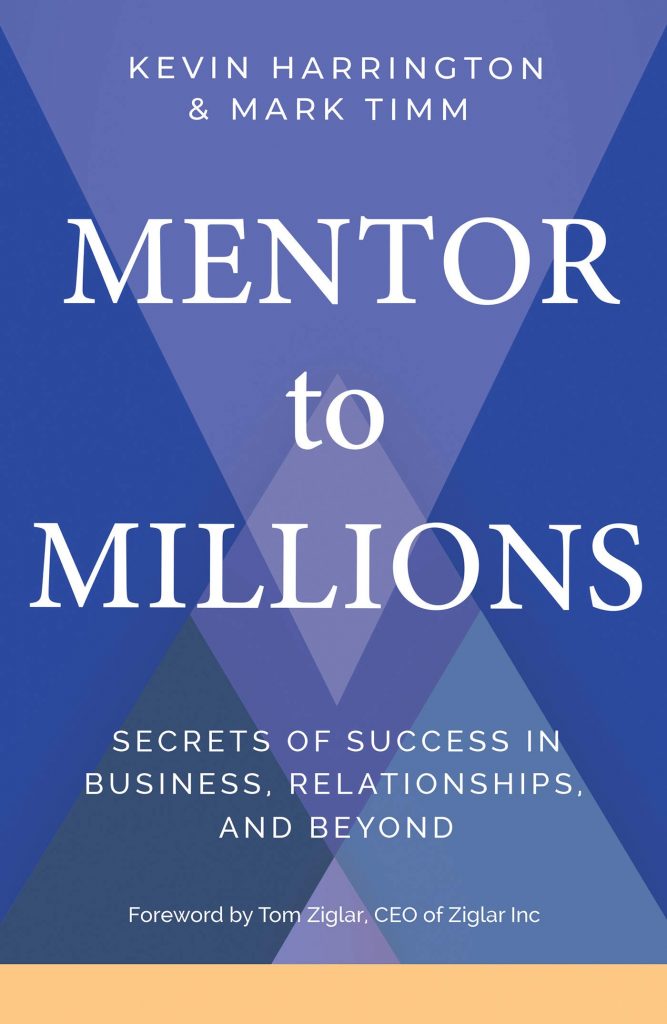
Sure. First of all, part of the reason I spent so much time mentoring is because I never had any till much later. And so I realized that there were a lot of moments for me, as a young entrepreneur of saying, somebody’s been right here before, I wish I knew, I wish they would tell me which way to go. Somebody’s already done this, and I’m sitting here about to probably make a mistake that someone could prevent it. So I realized later, I committed, I said, “When I have time, I will mentor because I know what it’s like to be in that position where you needed one.” And later, when I did get mentors, they were unbelievably invaluable. But I learned an important lesson, which is that, while industry experts might be kind of relevant, but the true method for finding a mentor is to find somebody, it’s more holistic, it’s more comprehensive, it’s more 360, find somebody you want to be like when you grow up.
Another one is if I’m building a travel startup, finding an executive in the hotel industry is less important than finding a human being that I look at and say, “I want to be like her when I grow up,” “I want to be like him when I grow up.” And you never stopped growing up. So I think the important lesson for that mentorship is to look at the way the whole person, right? Not just have they accomplished something. And by the way, I’ll tell you how I got there.
My first attempt at a mentor was an investor I have. It was an extremely successful business person. And he was the first investor I ever had for my very first company, which were the airport check-in kiosks. When you check-in at an airport now, those kiosks are where my first product. I went, got an investor, and I never asked him to be my mentor, but I took him that way. And he was teaching me business things. But I have to tell you, I was watching the way he ran his life, and every day, I said, first of all, I can’t wait to be disassociated from this human being. And second, he is serving as a great example of everything I don’t want to be when I grow up the way he treats people. So I started realizing that the only reason I picked him is because he knew the industry. And so I started saying maybe I should just find somebody that I want to be like.
Industry knowledge can be acquired, right? You can learn from books and other people, but the DNA part that how to run your life, your business, leadership, principles, core values, that stuff doesn’t come from a book; it comes from the quality of humans. So that’s why I evolved to say, don’t just pick somebody in an industry you want to work in, pick somebody who as a human being you wish you were like.
Everyone wants to be a winner. In marketing, a great way to convince people is to make them feel like they are a winner. Share on XYeah, with integrity. And the funny thing that I’ve learned is that people with the most integrity never talk about integrity because it’s like being in the water and being a fish, and you never talk about the water because it’s all that you know, and that’s just the world.
It should be obvious. You get that on the marketing side of your business. If a company says you can trust us, that’s already suspicious. Why are you saying that? Is there some reason we should be concerned? It should be automatic.
For sure. Now, there’s something behind you on the whiteboard that I’m curious about. You wrote “Sell more flowers,” and I’m very curious about what that means.
All right. So I will share that story with you again. Somebody once said to me, and I thought you’re going to be—not that I’m young—they said, “I thought you were gonna be way older than you are.” I said, “Why?” and they said, “You seem to have gotten a lot of stuff done in your life.” I feel there are two reasons: one, I failed quickly. Because I checked my ego at the door. When I’m wrong, I’m just wrong. Admit that you are wrong, learning from it, and redirecting yourself is fine. But the word pivot felt to me like it was created to make it sound like you failed on purpose. Which nobody ever did, right? When you screw up, you screw up. And so failing fast was important to me.
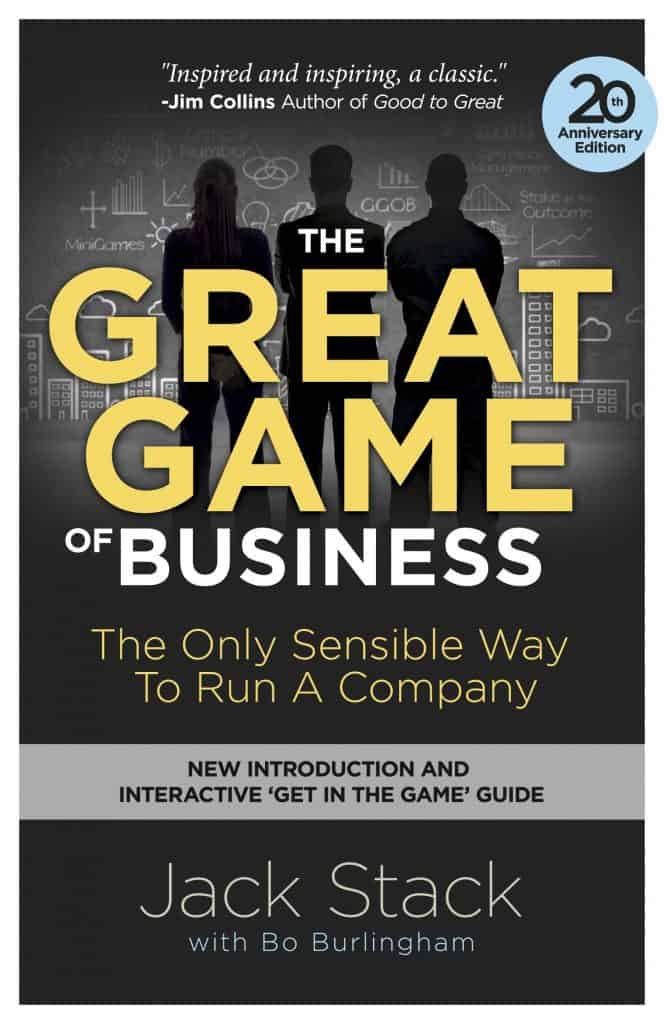
But there was another reason that if we were very efficient and got a lot done, and it said, sell more flowers story. And the story is that I was on stage with Jim McCann at the time, and he had built a little tiny flower shop in New York into the world’s number one florist, which is 1-800 Flowers. And I was asking him, how did you grow from a little tiny shop to the leader in your industry, a massive worldwide company. And he said, basically, relentless focus on only the things that matter. And I said, “Such as what?” he said, “Come visit.” So I went and visited them in New York, and that’s what’s written on the wall. He said, “Come with me and watch this,” and I recommend to all your listeners to do this, “First of all, write on the wall, the fundamental transaction that drives your business.” So for me back in the day, it was “Sell more hotel rooms.” Everything I do all day is useless unless somebody books a hotel room because that’s why we exist.
So step one is to be clear about why your business exists. But more importantly, write it all over the walls. And written on his walls, it said, “What are you doing today to sell more flowers?” And so he would stop people in the hall and say, “What are you doing right now?” and the employee would say something, and he would say, “And how is that going to help us sell more flowers?” If the employee couldn’t answer that, he said, “Put that down and go do something else?” So every day, every employee would constantly ask themselves because it’s written on the wall. How are you selling more flowers today? And so I loved the concept.
So I came back, and we would write on the wall. “What are you doing right now, and how is it helping us sell a hotel room?” And so people would constantly be looking, and they’d say, I don’t know. You know what, Stephan, I would tell people, even if I’m your CEO, and I walk up, and I say, “Everybody, could you do this for me?” my employees have the right to say no. And say, “I’m not clear on how the thing you asked me to do sells more flowers. So I’m going to say no, even if you’re the boss.” And it’s on me to explain why every activity every day helps us sell more flowers, or just stop doing it. So that’s why that’s on the wall. People that know me to know that story. And sometimes I’ll call people I’ll say how’s it going and people that I coach, and they’ll say, just out there selling flowers, because they know the story. But that’s the lesson. Right on your wall, the thing that matters to your business, and then make sure all the time you’re looking at your activity. And if you can’t see the clear path between what you’re doing now, and how it sells more flowers, stop doing it and go do something else.
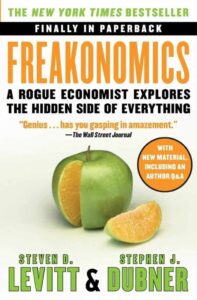
Right. And how does that relate to this concept of open-book management? I love the book, The Great Game of Business by Jack Stack, and it’s a foundational book about open-book management and sharing the metrics that matter, including financial ones, with the entire staff; everybody from the janitor of the company and up. So, where do you see the connection to that?
Do you want to know an even better example? I love that book too, and I love the concept, but I was blessed enough one day to spend an entire day with Sam Walton. And one of the cool things that Sam showed me was we stopped into a store. And the reason that triggered this is he went and found the janitor who was cleaning a particular section of the store. I don’t know what part of let’s just say it was small electrics, blenders, and I don’t remember where we were. But he said, “What department are you cleaning?” and he said, “Household electronics.” And Sam said, “What’s the revenue per square foot of our household appliance department?” and the janitor knew the answer, and I was blown away. Now, this is long ago. Nonetheless, his point was, the more every employee at every level understands the mission and the metrics, the more ways they can find to contribute to it, right?
If you tell everybody in every department. Just do your job, don’t worry about it, then no one is ideating, no one is creating on anything except their little corner of the world. When you open the book, we have always managed by consensus management. We have always shown all the employees answered any question. You want to understand the financials, how the business works. The worst case, I had a CEO one day say to me, “Oh, we’re a very open company,” I said, “Really?” He said, “Sure.” I said, “Watch this.” So true story, I went over to engineering with the CEO. I got an engineer, and I asked him to do a favor for me. I had the CEO hide behind a cubicle wall, I have the engineer walk over to marketing in this company and say, “I think I have an idea that might save our company millions of dollars a year. But I need to understand the marketing plan to see how this idea fits.” The marketing people said, “We don’t come to tell you how to do your job, go back to engineering.” He said, “I’m not telling you how to do your job. I scripted all this.” He said, “I just have a really good idea. And I think it’ll save the company millions.” And they said, “How about you do your job, and we’ll do ours. Do we tell you how to do engineering?” He said, “No, but you’re more than welcome if you have an idea.” They said, “Please leave.” And the CEO is hidden behind the wall, I said, “Really? That’s your definition of an open environment? Marketing telling engineering to go away and don’t ask us questions, you do your job, we’ll do ours, even when the guy said, I have an idea that might save us millions. That’s crazy.”
So people tell me they’re open to consensus management and open innovation, they are not. Here’s why; your metrics, your measurement, your compensation is based on me making my numbers. So if I get paid in marketing only for the results of the marketing department, I don’t want engineering coming over. But if your metrics are such that part of my compensation is the company’s overall performance, let’s say that’s 40% of my compensation. And guess what I’m going to wonder as an employee, what drives the company’s overall performance, and how can I help with that, too? So, in that case, that marketing person would have said, “Sure, sit down, let me want to hear your idea because part of our compensation is the company’s overall profitability. And you seem to have an idea that would help with profitability. We’re all on the same boat rowing in the same direction.” So it’s really important to practice that, not just to say it. And then the metrics you collect, and the compensation structure you have is based on something completely different than what you’re saying out loud.

Yeah, so the incentives need to be aligned. I learned that from the book Freakonomics, which is one of my favorite business books. So cool. Oh, I wish we could keep going, but I know we need to wrap up the interview. If we could send our listeners to fantastic resources to learn more from your brilliance, what would we want to send them to?
I wrote a book with a co-author, David Finkel. Dave and I wrote a book called Scale: Seven Proven Principles to Grow Your Business. So Scale is the answer to the question everybody kept asking me because I’ve been part of multiple companies that scaled to global and multi-billion dollar companies. People said, “What are the things I need to do to make my company scale as you guys did?” So Dave and I wrote a book called Scale.
Yeah, I’ve had David on this podcast, by the way.
I’m a big fan of David. We co-wrote a book together. And then, I also have both mastermind groups and a workshop called Explosive Growth Workshop, and those are on jeffhoffman.com. You can find it on my website.
Awesome. Thank you so much, Jeff. This was just fabulous and inspiring.
Thanks for having me.
Thank you. And listeners, do something, take some powerful action, start a movement, make a difference in the world, and we’ll catch you next week.





